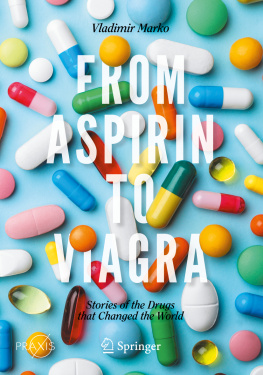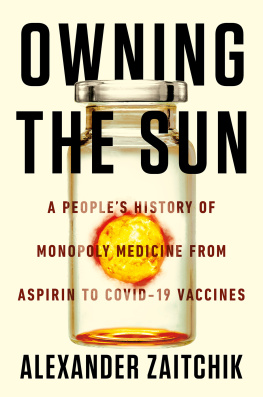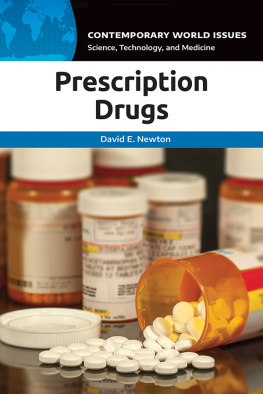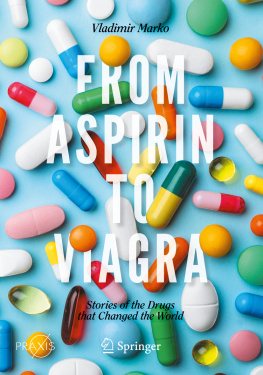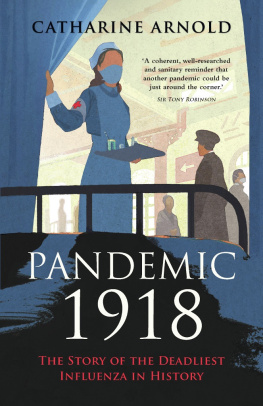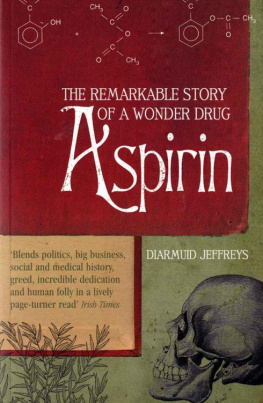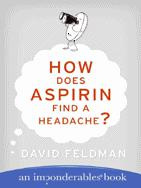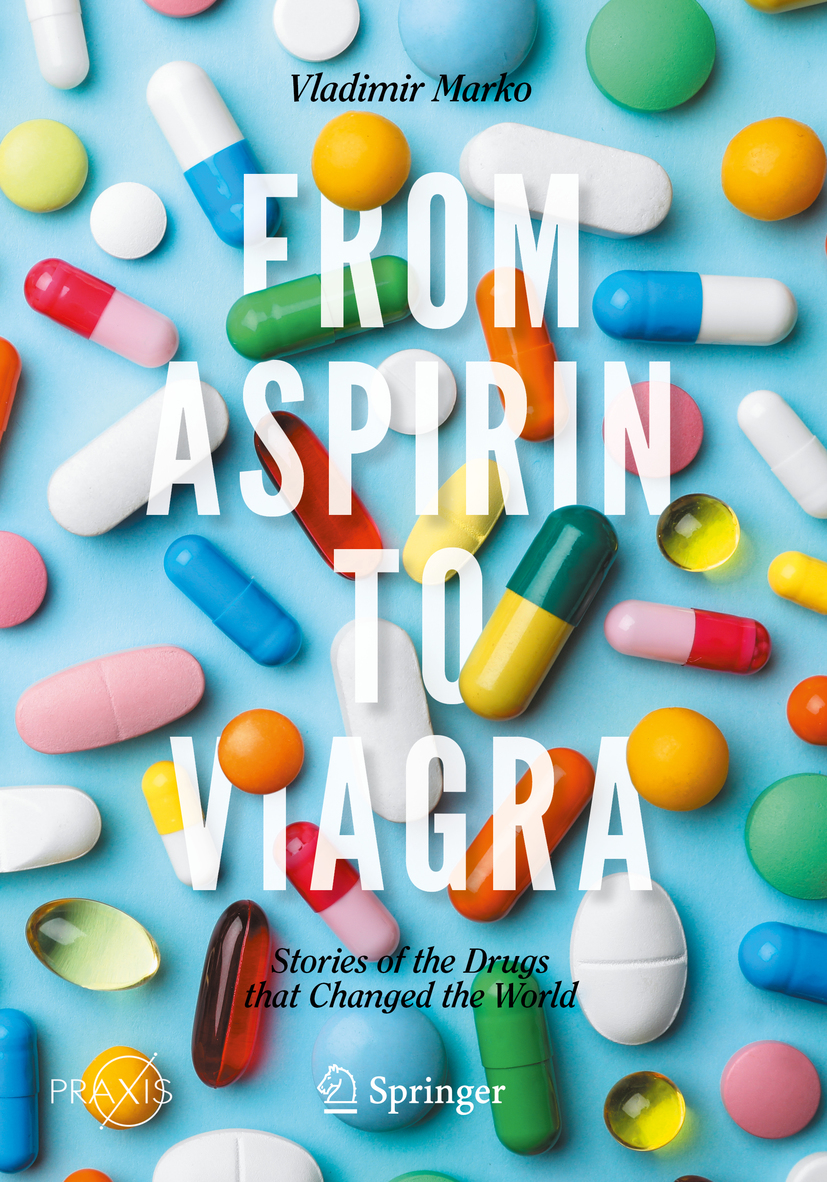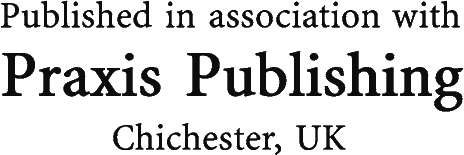Springer Praxis Books Popular Science
This book series presents the whole spectrum of Earth Sciences, Astronautics and Space Exploration. Practitioners will find exact science and complex engineering solutions explained scientifically correct but easy to understand.Various subseries help to differentiate between the scientific areas of Springer Praxis books and to make selected professional information accessible for you.
Vladimir Marko
From Aspirin to Viagra
Stories of the Drugs that Changed the World
Vladimir Marko
Bratislava, Slovakia
Springer Praxis Books
ISSN 2626-6113 e-ISSN 2626-6121
Popular Science
ISBN 978-3-030-44285-9 e-ISBN 978-3-030-44286-6
https://doi.org/10.1007/978-3-030-44286-6
English translation by Skrivanek Slovensko, www.skrivanek.sk, of the original Slovak edition published by Ikar, Bratislava, 2018
Springer Nature Switzerland AG 2018, 2020
This work is subject to copyright. All rights are reserved by the Publisher, whether the whole or part of the material is concerned, specifically the rights of translation, reprinting, reuse of illustrations, recitation, broadcasting, reproduction on microfilms or in any other physical way, and transmission or information storage and retrieval, electronic adaptation, computer software, or by similar or dissimilar methodology now known or hereafter developed.
The use of general descriptive names, registered names, trademarks, service marks, etc. in this publication does not imply, even in the absence of a specific statement, that such names are exempt from the relevant protective laws and regulations and therefore free for general use.
The publisher, the authors and the editors are safe to assume that the advice and information in this book are believed to be true and accurate at the date of publication. Neither the publisher nor the authors or the editors give a warranty, expressed or implied, with respect to the material contained herein or for any errors or omissions that may have been made. The publisher remains neutral with regard to jurisdictional claims in published maps and institutional affiliations.
Project Editor: Michael D. Shayler
This Springer imprint is published by the registered company Springer Nature Switzerland AG
The registered company address is: Gewerbestrasse 11, 6330 Cham, Switzerland
To my wife for 44 years of our lives
Preface
Recently, I opened our medicine cabinet at home and found an assortment of 36 different drugs. And honestly, my wife and I consider ourselves to be healthy people. If we look back 100 years, we would have had, at best, bottles of aspirin and quinine. It is very difficult to imagine the world at the dawn of the 20th century, when we were unaware of the existence of very common things used today, like penicillin, insulin or vitamin C, let alone innovations like contraceptives or drugs that fight mental disorders. We did not know a large majority of the drugs that we see as a natural part of our lives today, to the point that often we are not even aware of how we depend on them. Had these drugs not existed, the majority of us would not even be alive today and would not be able to read this book. Our parents or our grandparents would likely have died due to one of the vast number of deadly diseases that have plagued humankind since the beginning of time.
The drugs we know of today have a short history. Until the 19th century, official medicine had no actual need for these drugs. For many centuries, starting from ancient times, diseases were thought to be caused by an imbalance of four basic bodily fluids: blood, phlegm, yellow bile and black bile. Doctors were meant to rebalance these fluids through methods like bloodletting, the use of leeches, serving laxatives, enemas, or substances inducing vomiting. Over the course of one year, the French King Louis XIII received 212 enemas, was induced to vomit 215 times and underwent bloodletting 47 times. His son and heir, Louis XIV, was rumored to have undergone more than 200,000 enemas, sometimes as many as four a day. The French playwright J.B. Molire illustrated the situation with official medicine very well in one of his plays: (Doctors) can talk fine Latin, can give a Greek name to every disease, can define and distinguish them; but as to curing these diseases, thats out of the question. Those who were reliant on the help of this kind of medicine were more or less out of luck. When George Washington became ill in 1799 and began to complain of neck pain, the medical help that was called upon did everything within their capacity to assist. They induced blisters and let his blood. He ended up losing about two and a half liters of blood, but despiteor more likely becauseof this treatment, George Washington died ten hours later.
It was much easier for the common people. They would often seek help from the unofficial medicine practiced mostly by village women. These healers were not interested in the official teachings of bodily fluids. Instead, they would focus more on the objects that they found around themselves. They knew of the properties of many different flowers and herbs and would use them to cure diseases, although this came at the risk of being accused of witchcraft and burned at the stake. Some of these methods are still used today. An example of the difference between official and unofficial medicine was the approach to treating scurvy in the 18th century. Scurvy, as we now know, is a disease caused by the deficiency of vitamin C. Official medicine said that it was caused by a disease of the black bile, which they considered to be dry and cold. For this reason, they considered it necessary to treat it with something warm and moist, such as a broth brewed of barley. They did not use citrus fruits because these were also cold. A Miss Mitchell from Hasfield, located in the province of the Duchy of Gloucestershire, knew nothing of black bile and instead used a mixture of medicinal herbs, wine and orange juice to treat scurvy.
This book contains stories from the history of ten different drugs that have greatly influenced humanity. They are, in alphabetic order: aspirin, chlorpromazine, contraceptive pills, insulin, penicillin, Prozac, quinine, vaccines, Viagra, and vitamin C. The selection of these drugs is often subjective. The authors intent was not to describe the drugs as such, but instead to map the road that was taken to their discovery or invention. The road was often rough, but also adventurous. At the same time, the author looked to record the circumstances associated with their subsequent life. This book is also about the people who chose this path. The majority of them, with the exception of a few charlatans, were inspired by their deep need to help others and by their belief that what they were doing was the right thing, even if by todays standards their methods were harsh.
Vladimir Marko
January 2020
Acknowledgements
I would like to thank the following experts for so kindly reading parts of the manuscript, providing their expertise and sharing with me their inestimable observations: Dr. Viera Konkov, CSc; Dr. Katarna Ralov, CSc; Dr. Katarna Mikuov, PhD; Dr. Danica Caisov; and Dr. Duan Krkoka, PhD.

